
Angela Morley was an English composer and conductor who became a familiar household name to BBC Radio listeners in the 1950s. She attributed her entry into composing and arranging largely to the influence and encouragement of the Canadian light music composer Robert Farnon. Morley transitioned in 1972 and thereafter lived openly as a transgender woman. Later in life, she lived in Scottsdale, Arizona.
"(You'd Be So) Easy to Love" is a popular song written by Cole Porter for William Gaxton to sing in the 1934 Broadway show Anything Goes. However Gaxton was unhappy about its wide vocal range and it was cut from the musical. Porter re-wrote it for the 1936 film Born to Dance, where it was introduced by Eleanor Powell, James Stewart, and Frances Langford under its alternate title, "Easy to Love". The song was only later added to the 1987 and 2011 revivals of Anything Goes under the complete title "You’d Be So Easy to Love".

Never Never Never is a 1973 album by Shirley Bassey. It features the hit single title track, which was a UK top 10 hit, which became one of Bassey's best-known songs. The album also became a top 10 hit in the UK and was a moderate hit in the US.

Let's Face the Music is the sixth Shirley Bassey studio album, released in 1962, and arranged by Nelson Riddle. Kenneth Hume, Shirley Bassey's husband and manager wrote the sleeve notes for this album, in which he gives an insight into how this album came to being: "When Vic Lewis booked Nelson Riddle for a tour with Shirley, we were all very excited; being great fans of Nelson Riddle's from way back...so when someone suggested them doing an LP together, we thought that this would not be possible, remembering that Nelson was under contract with another recording company." Nelson Riddle was under contract to Capitol Records at the time, so Bassey's producer Norman Newell went about to secure his services for an album. While on the tour, Bassey, Riddle, and Bassey's music director Raymond Long discussed what form the album should take. Shortly after the tour was completed, the recording sessions began.

Thank You for the Years is a 2003 album by Dame Shirley Bassey.

Shirley is Shirley Bassey's fourth studio album, her second for Columbia, and was recorded with Geoff Love and his orchestra. It was her first album to enter the top ten of the UK Albums Chart, a feat she would not duplicate until Something in 1970. This album was issued in mono and stereo. The stereo version of this album was issued on CD in 1997.
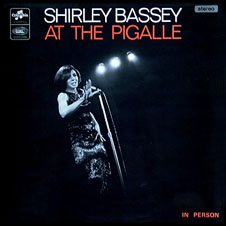
Shirley Bassey at the Pigalle is Shirley Bassey's first live album, recorded on the opening night of an eight-week engagement at the Pigalle, a nightclub in the West End of London. This performance, on 12 September 1965, earned Bassey outstanding reviews. The album was released that same year. It was Bassey's final album for EMI's Columbia label.

The Fabulous Shirley Bassey is the third studio album by Welsh singer Shirley Bassey, and her first for Columbia Records. It was recorded with Geoff Love and his orchestra, and peaked at #12 in the UK album chart in early 1961. Released in 1959, this was the first studio album from Shirley Bassey with completely new material. Her two previous albums issued on the Philips label were collections of new recordings and previously released material, recorded between 1956 and 1958.

I Am What I Am was the only studio album recorded by Shirley Bassey for the Towerbell Records label. Several other tracks were also recorded at this label and issued as singles only. The recording sessions took place at Olympic Studios, Barnes, London, in July and August 1984. Following the success of the previous album All by Myself, this album peaked at number 25 in the UK album chart and reached Gold status. This release was the first digitally recorded album made by Shirley Bassey and was issued on vinyl, cassette and CD. Consisting of mainly re-recordings from Shirley Bassey's back catalogue and two new songs, this album was recorded 'live' with The London Symphony Orchestra, conducted by Carl Davies. The album also reunited Shirley Bassey with Norman Newell, who had served successfully as her producer throughout the 1960s.
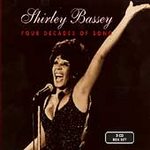
Four Decades of Song is a three-CD compilation from Shirley Bassey issued in 1996. This set features 54 songs recorded between 1959 and 1993. In 2008 EMI repackaged and retitled this boxset as Shirley Bassey The Collection; the new version had six extra tracks.

Bassey – The EMI/UA Years 1959–1979 is a 5-CD boxset compilation from Shirley Bassey issued in 1994, this set features 94 studio recordings on four CDs, recorded for EMI/United Artists between 1959 and 1979. Disc five features a previously unreleased live recording from Carnegie Hall. The boxset was reissued by EMI in 2010 in a standard jewel case set.

I've Got a Song for You is a 1966 album by Shirley Bassey. Bassey had left EMI's Columbia Label, and this was her first album for United Artists, a label she would remain with for approximately 14 years. This album and the following release And We Were Lovers were produced by Bassey's former husband, Kenneth Hume. The album entered the UK Albums Chart at #26, but only remained on the chart for one week, and failed to chart in the US, despite her having received outstanding reviews for live engagements in New York and Las Vegas that same year, and the fact that the album was recorded in New York. It was an inauspicious start for her at UA, as none of her albums would chart either in the UK or the US until 1970. In that year, 1970, Bassey would begin to produce more contemporary pop-oriented albums, but here in 1966, despite scoring her biggest hit with "Goldfinger" a year or so earlier, she was still firmly in the traditional pop genre.

Born to Sing the Blues is the debut album by Welsh singer Shirley Bassey. It was released on a 10" LP in 1957 by the Philips Records label. Long-playing records were newly introduced in the mid-1950s and the 10" album was briefly introduced as an album format, shortly before the 12" format became the standard long playing format.
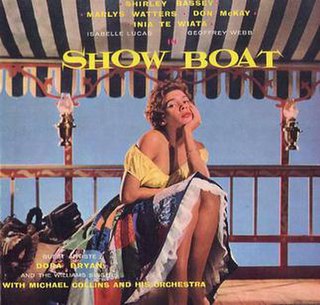
Show Boat is a studio recording of the 1927 musical Show Boat by Jerome Kern and Oscar Hammerstein II. The album was recorded in the summer of 1959 at the No.1 studio, Abbey Road, London, and issued by the 'His Master's Voice' label, a subsidiary of EMI, which was run at this time by Norman Newell. It features a cast that was formed for this recording only; this cast did not perform the show live in any theatre production.
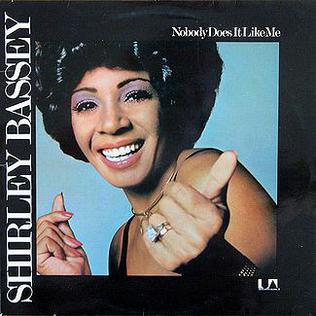
Nobody Does It Like Me is a 1974 album by Shirley Bassey. Bassey's recordings had been selling well since 1970, scoring three top ten singles and three ten top albums. Nobody Does It Like Me was recorded with a new producer, George Butler, and brought a partial return to the traditional pop sound of Bassey's pre-1970s career. Here, the title track "Nobody Does It Like Me" and "When You Smile" harken back to the big band era. Bassey's soaring vocals on Paul Anka's "I'm Not Anyone" and the slightly funky "Morning in Your Eyes" contrast with a delicately rendered "Davy". The duet "Davy", recorded with the song's composer Benard Ighner, is one of the rare occasions that Bassey would share the credits with another vocalist; it was also issued as a single and hit #44 on the US Adult Contemporary chart. The album closes with Bassey's reading of Stevie Wonder's "You Are the Sunshine of My Life". This album failed to chart in the UK, and peaked at #142 in the US. Her next two studio albums would be top 15 albums in the UK.

Good, Bad but Beautiful is a 1975 album by Shirley Bassey. In the first half of the decade, Bassey recorded nine albums, with three making the top ten. In March 1975, Bassey released a compilation that became her highest-charting album to date, The Shirley Bassey Singles Album (#2), and reflects the momentum Bassey had maintained since her 1970 "comeback". Good, Bad but Beautiful, released in the autumn of 1975, spent seven weeks on the UK Albums Chart, peaking at #13, and earned a silver disc. The album reflects the formula that brought Bassey back to the charts: a combination of contemporary songs combined with her forte of standards, show tunes, and torch songs, featuring arrangements aimed squarely at the adult contemporary, or middle-of-the-road, audience. This was also achieved by modifying her backup orchestra to include electric guitars, a string and brass section with a more contemporary sound, and drumming that is more soft rock-oriented than jazz-oriented, while side two's opener, "Feel Like Makin' Love" displays a smooth jazz style.
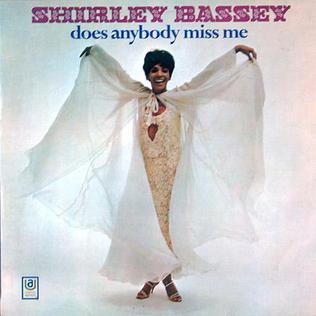
Does Anybody Miss Me is a 1969 album by Shirley Bassey. In 1969 Bassey moved her home to Lugano, Switzerland, with her second husband Sergio Novak, whom she had married in Las Vegas in August 1968. Remaining as a tax exile prevented her from performing and recording in the UK. In this period she continued to perform and record in Italy and the US. This album was recorded in the US and produced by the American producer Dave Pell, with arrangements by Artie Butler. The tracks on this album are a selection of standards and show tunes. The title track Does Anybody Miss Me was issued as a single in the UK, backed with the non album track Fa Fa Fa, but this failed to make any impression on the chart. Does Anybody Miss Me has remained part of her live show and was recorded as the opening track of the album Live At Talk Of The Town in 1970. This album saw Bassey re-record her 1958 UK #1 hit single As I Love You which she had previously released on the Philips label.
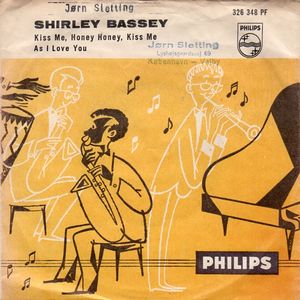
"Kiss Me, Honey Honey, Kiss Me" is a popular song written by Michael Julien and Al Timothy. It was first recorded by Welsh singer Shirley Bassey and released as a single in 1958 to commercial success. The song was then included on Bassey's album The Bewitching Miss Bassey (1959) and would become one of her most recognisable tunes. It has since been covered by numerous artists.
"As I Love You" is a 1958 hit song by Shirley Bassey with Wally Stott & His Orchestra, written by Jay Livingston and Ray Evans for the Universal International picture, The Big Beat (1958).

25th Anniversary Album is a compilation album by Shirley Bassey. Released in 1978 to mark her 25th year in show business, the album was a double set, comprising 40 tracks. The songs included span just 20 of the 25 years from 1957 to 1976, however, her first professional contract is dated 1953. Bassey had toured extensively throughout 1978 to mark her 25 years. This collection, including her biggest hits and some lesser-known recordings, became one of her biggest in the UK, where it reached No.3 and spent 12 weeks on the album chart.


















